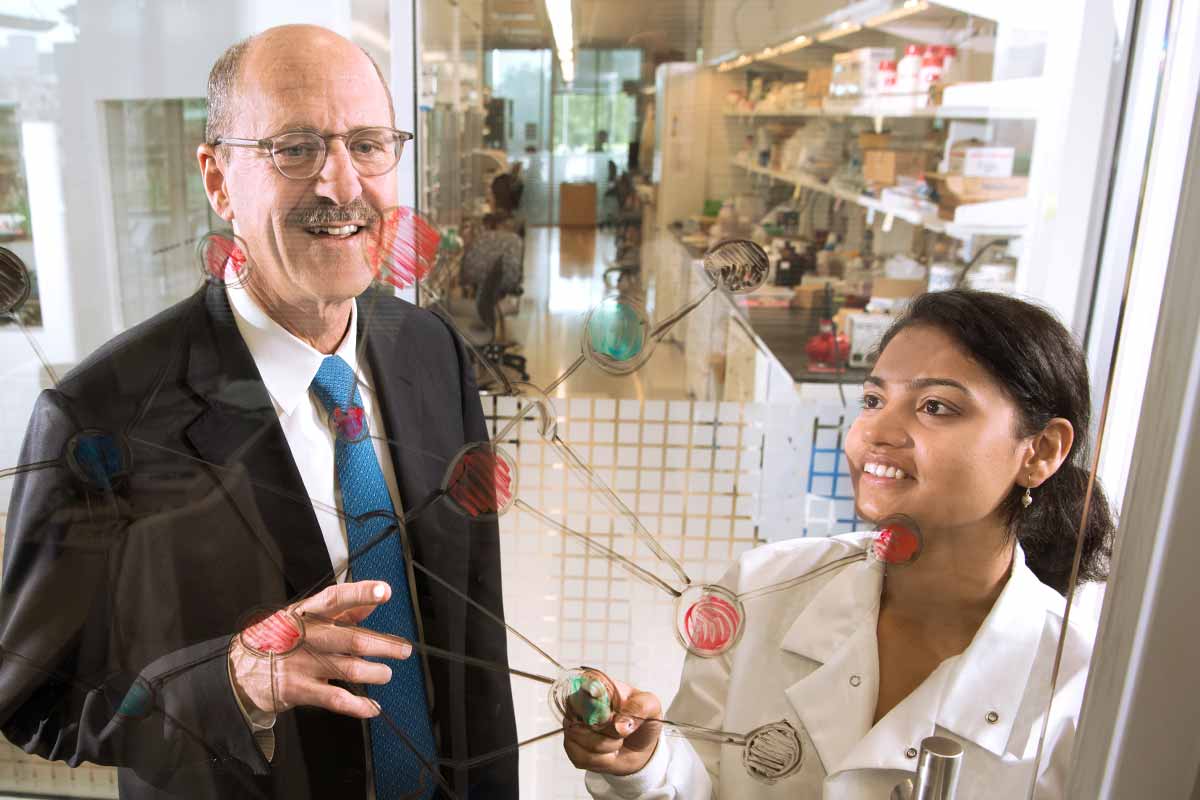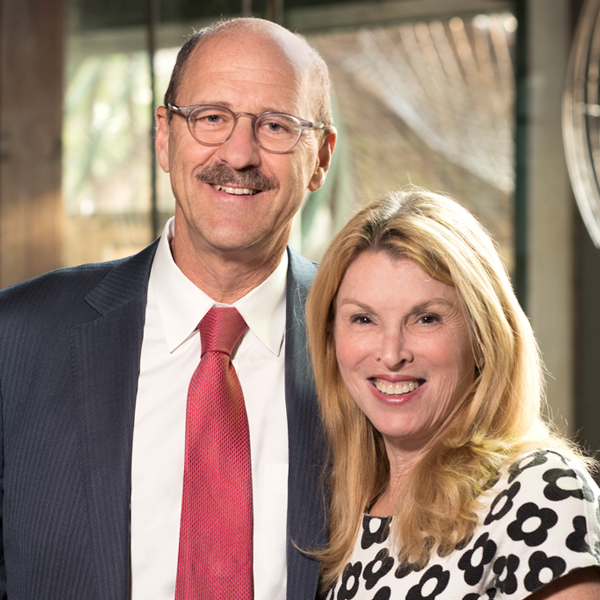
David H. Perlmutter, MD, is closing in on his first year as executive vice chancellor for medical affairs and dean of the School of Medicine.
Originally from New York, Perlmutter has moved to St. Louis three times — first as a medical student at Saint Louis University, then as a faculty member in pediatrics at Washington University, and now as dean. Most recently, he served as the Vira I. Heinz Endowed Chair of the Department of Pediatrics at the University of Pittsburgh and as physician-in-chief and scientific director of Children’s Hospital of Pittsburgh.
Personalized medicine is No. 1 on his priority list, and he believes the School of Medicine is positioned to be a leader in the field.
Tell us about your medical education at Saint Louis University.
I didn’t realize my own potential for a long time. I thought I wanted to go to medical school and got into Saint Louis University, off the wait list. I didn’t unpack for six months because I didn’t think I would make it. But by the time I graduated, I had become a very different person. At graduation, I received so many awards that my family just couldn’t get over it; they thought I was a totally different human being.
Basically, what had happened — and I didn’t fully realize this until years later — was that I had developed a love of medicine and of learning. It was in medical school, here in St. Louis, where I found that I could work with unbelievable capacity, discipline and focus and that I had an insatiable desire to learn more about physiology, biology and the medical profession overall.
“There’s an uncommon level of support at the university for physician-scientists.”
In 1983, you joined the Harvard Medical School faculty, but left for a position at Washington University. Why?
At Harvard, I was extremely fortunate to work in Dr. Harvey Colten’s lab. He was a phenomenal scientist and mentor, and it was while working with him that I truly realized that biology was a key to understanding human diseases. When he took over as head of the Department of Pediatrics at Washington University in 1986, he asked me to come along. It might have seemed an odd decision — I didn’t have grant funding, my wife and I had a baby and another on the way, and I didn’t expect to go back to St. Louis — but I couldn’t say no, especially after talking with the amazing people here. I met with Phil Needleman, Philip Stahl, Stuart Kornfeld, Jeff Gordon, Stan Korsmeyer and on and on. It was one giant after another — and it wasn’t just this feeling of being surrounded by intellectual horsepower, there was a very evident feeling of nurturing and community. You come here and you become part of the community. When I set up my lab, I interacted with every single department and with investigators throughout the school. I became friends and colleagues with so many people who reached out to me. I loved it here.
After 30 years in medicine — first here and later at the University of Pittsburgh — what prompted you to return as dean?
More than just one thing. St. Louis is a wonderful city and is dear to my family. One of the reasons I believe Washington University has such an incredibly successful medical school is because of the deep sense of community here. But also, there’s an uncommon level of support at the university for physician-scientists, and that was a major draw for me. The Medical Scientist Training Program here is the best in the world, and the physician-scientists are treasured in a way you don’t see anywhere else. Also, becoming dean meant I could play a role in making the changes and innovations that are so important to health care and biomedicine, and where better to be at the forefront of what is needed than Washington University? There is so much going on here — in advancing science and curing diseases, in educating future doctors and scientists, and in providing excellent health care to people who need us. The commitment, energy and devotion you see here every day are incredible.
Why are you focused on personalized medicine?
Medicine treats many people in the same way, even though they have known differences in the course of their diseases. The promise of personalized medicine is that we can become more sophisticated in our understanding of each disease, identify personal variations and tailor therapy to those variations in a way that is likely to be more effective. Many opportunities have arisen as genomic sequencing and editing have become more affordable, from developing new targets for drugs to speeding the diagnosis of life-threatening illnesses. Simply put, the long-term objective is to give the right treatment to the right patient with the aim of saving and improving lives.
“The way I look at it, the biggest shot we have at reducing health-care costs is through our research.”
How is Washington University positioned to be a leader in personalized medicine?
There are so many strengths at the university in the area of personalized medicine. We have centers for achieving different kinds of genetic sequencing here: a center that can help researchers reproduce a disease in a cell line or a mouse; a center where scientists can make induced stem cells; drug-focused centers that will help investigators zero in on therapeutics — the list goes on. Each of these many centers and the magnificent scientists who work in them are keys to tackling disease. I believe we need to continue focusing on the many areas where the university is an established leader and to develop core facilities that can rapidly incorporate new technology. Right now, for example, we have researchers working on personalized vaccines to treat breast cancer and melanoma. I believe we are at a tipping point for understanding human disease and improving patient care. Washington University is so well-positioned to advance knowledge and improve health and well-being. It is our responsibility to embrace this opportunity for the benefit of society.

How can personalized medicine improve the health-care system?
If we can realize at least some parts of the dream of personalized medicine, we will be treating people in a much different way than we treat them today. Personalized medicine would allow us to provide a particular therapy only to patients it would help, sparing others from unnecessary treatments and harsh side effects. Meanwhile, other patients would receive therapy specific to them. So if only 20 or 30 percent of patients with, for example, breast cancer are receiving the most extensive and expensive therapy, that should reduce health-care costs and provide optimal care. The same approach could be applied to other diseases. And this is a great place to figure these things out because we have so much genomic expertise and tremendous investigators in cancer, immunology, the microbiome, Alzheimer’s disease, age-dependent degenerative diseases and other major areas of emphasis.
The way I look at it, the biggest shot we have at improving medical care and reducing health-care costs is through our research. There are many incremental ways to reduce such costs through process and changing how we do things. But what will really transform health care will come from research, and, for me, personalized medicine will be key.
What else would you like to see emphasized at the School of Medicine?
I want to see discoveries benefit our patients sooner, and I believe this will require more attention to commercialization. The genomic revolution has positioned us to move this forward in a more timely way, and the university is working hard to facilitate entrepreneurship in a most conscientious way. This school has always been noted for its great collaborations, but I also want to explore potential industry partners for shared research programs.
“Nobody here is going to be satisfied doing the same thing tomorrow that he or she is doing today.”
Physician-scientist career development is also very important, particularly since the percentage of physicians nationally who are conducting research has been dropping in recent years. And another key emphasis for me will be diversity and inclusion throughout the Medical Campus, from students, to staff, to faculty. We need to improve diversity in our workforce in particular and become more successful at developing the careers of minorities. It’s so important to understand that we are richer as a whole with varying perspectives. Diversity and inclusion are imperative.
I also want to continue building on our excellent faculty practice and improving our ability to serve the community. It’s an honor to provide exceptional health care to so many citizens throughout the St. Louis region and beyond. I’ve become very moved by how important our role is as a safety net.
Now that you’ve been here nearly a year, what has surprised you most?
I was surprised at some of the breathtaking science here. Even though I knew great things were going on at this school, I had no idea how extraordinary the breadth and the depth of the talent are and, likewise, how exciting the programs are. To a certain extent, it’s daunting because I see myself as being responsible for that now. It’s very humbling. But what’s exhilarating is that nobody here is going to be satisfied doing the same thing tomorrow that he or she is doing today. Everybody here is interested, like I am, in pushing the envelope and being at the forefront of new discoveries that ultimately will benefit mankind. It’s an amazing place to be, and I’m so excited and fortunate to be a part of it.
Interview conducted and compiled by writer Elizabethe Holland Durando.
Published in the Autumn 2016 issue


